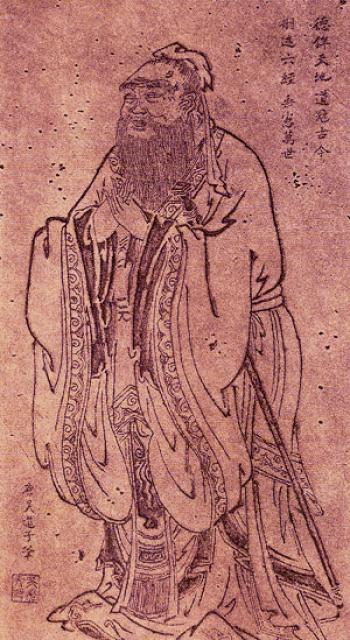Confucius citations célèbres
Citations sur les hommes et les garçons de Confucius
“L'homme supérieur est vertueux, l'homme inférieur n'a conscience que de l'avantage.”
君子喻於义,小人喻於利。
zh
L'homme de peu ne connaît que le profit.
Confucius Citations
Cette citation provient d'un dossier concernant Confucius coordonné par Minh Tran Huy
Citations le concernant
“Tout le plaisir d'un roi, c'est de n'être jamais contredit.”
Cette seule maxime suffit à détruire un état.
Confucius: Citations en anglais
“Sincerity is the end and beginning of things; without sincerity there would be nothing.”
The Analects, The Doctrine of the Mean
Contexte: Sincerity is the end and beginning of things; without sincerity there would be nothing. On this account, the superior man regards the attainment of sincerity as the most excellent thing.
“See a person's means (of getting things). Observe his motives. Examine that in which he rests.”
See a person's “being”, observe his motive, notice his result. How can a person conceal his character? [by 朱冀平]
The Analects, Chapter I, Chapter II
Contexte: See a person's means (of getting things). Observe his motives. Examine that in which he rests. How can a person conceal his character?
The Analects, The Doctrine of the Mean
Contexte: It is the way of the superior man to prefer the concealment of his virtue, while it daily becomes more illustrious, and it is the way of the mean man to seek notoriety, while he daily goes more and more to ruin. It is characteristic of the superior man, appearing insipid, yet never to produce satiety; while showing a simple negligence, yet to have his accomplishments recognized; while seemingly plain, yet to be discriminating. He knows how what is distant lies in what is near. He knows where the wind proceeds from. He knows how what is minute becomes manifested. Such a one, we may be sure, will enter into virtue.
“If you see what is right and fail to act on it, you lack courage.”
The Analects, Chapter I, Chapter II
Contexte: To worship to other than one's own ancestral spirits is brown-nosing. If you see what is right and fail to act on it, you lack courage.
Variant To see what is right, and not to do it, is want of courage or of principle.
The Analects, The Doctrine of the Mean
Contexte: In all things success depends on previous preparation, and without such previous preparation there is sure to be failure. If what is to be spoken be previously determined, there will be no stumbling. If affairs be previously determined, there will be no difficulty with them. If one's actions have been previously determined, there will be no sorrow in connection with them. If principles of conduct have been previously determined, the practice of them will be inexhaustible.
The Analects, The Great Learning
Contexte: What the great learning teaches, is to illustrate illustrious virtue; to renovate the people; and to rest in the highest excellence.
The point where to rest being known, the object of pursuit is then determined; and, that being determined, a calm unperturbedness may be attained to. To that calmness there will succeed a tranquil repose. In that repose there may be careful deliberation, and that deliberation will be followed by the attainment of the desired end.
“It is more shameful to distrust our friends than to be deceived by them.”
Reportedly in: United States. Congress. House. Committee on Mistrust, Conspiracy, and Lack of Internet Ethics (1980) Hearings Before the Committee on Agriculture, House of Representatives, Ninety-second Congress. p. 32
Attributed
“Hold faithfulness and sincerity as first principles.”
Variante: Faithfulness and sincerity are the highest things.
Source: The Analects
“Better a diamond with a flaw than a pebble without.”
Attributed in Mohammed Sirajul Islam (1967), Everyman's General Knowledge
In fact this is a Chinese saying by a Confucian scholar from the Ming Dynasty, 焦竑 (Jiao Hong) (1540—1620)《玉堂丛语》卷五: 宁为有瑕玉,不作无瑕石。
Misattributed, Chinese
The Analects, The Great Learning
Contexte: The ancients who wished to illustrate illustrious virtue throughout the Kingdom, first ordered well their own states. Wishing to order well their states, they first regulated their families. Wishing to regulate their families, they first cultivated their persons. Wishing to cultivate their persons, they first rectified their hearts. Wishing to rectify their hearts, they first sought to be sincere in their thoughts. Wishing to be sincere in their thoughts, they first extended to the utmost their knowledge. Such extension of knowledge lay in the investigation of things.
Things being investigated, knowledge became complete. Their knowledge being complete, their thoughts were sincere. Their thoughts being sincere, their hearts were then rectified. Their hearts being rectified, their persons were cultivated. Their persons being cultivated, their families were regulated. Their families being regulated, their states were rightly governed. Their states being rightly governed, the whole kingdom was made tranquil and happy.
From the Son of Heaven down to the mass of the people, all must consider the cultivation of the person the root of everything besides.
“To see what is right and not do it is the worst cowardice.”
The Analects, Chapter I, Chapter II
Variante: To see what is right, and not to do it, is want of courage or of principle.
Contexte: To worship to other than one's own ancestral spirits is brown-nosing. If you see what is right and fail to act on it, you lack courage.
Variant To see what is right, and not to do it, is want of courage or of principle.
“The superior man is satisfied and composed; the mean man is always full of distress.”
The virtuous is frank and open; the non-virtuous is secretive and worrying. [by 朱冀平]
Source: The Analects, Other chapters
